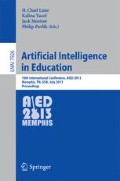Abstract
This paper describes a method for improving students’ help-seeking behavior by creating a teammate relationship between intelligent tutors and students. Help seeking in intelligent tutors involves student self-regulation as described in learning theory and can be explored from the perspective of social psychology. We describe an experiment in which ninety-seven students were randomly assigned to treatment and control conditions and students in the treatment group were supported to relate to the Wayang Math Tutor as teammates by providing the help button named “Work Together”. The result suggests that students who treated the tutor as teammates saw more hints (asked for more hints), exhibited reduced quick-guessing behavior and did not abuse hints while working together to solve math problems.
Access this chapter
Tax calculation will be finalised at checkout
Purchases are for personal use only
Preview
Unable to display preview. Download preview PDF.
References
Aleven, V., McLaren, B., Roll, I., Koedinger, K.: Toward meta-cognitive tutoring: A model of help seeking with a Cognitive Tutor. Int. J. Artif. Intell. Educ. 16, 101–128 (2006)
Woolf, B.P.: Building Intelligent Interactive Tutors: Bridging Theory and Practice. Morgan Kaufmann (2009)
Nass, C., Fogg, B.J., Moon, Y.: Can computers be teammates? Int. J. Hum.-Comput. Stud. 45, 669–678 (1996)
Cooper, B.: Care-making the affective leap: More than a concerned interest in a learner’s cognitive abilities. Int. J. Artif. Intell. Educ. 13, 3–9 (2003)
Self, J.: The defining characteristics of intelligent tutoring systems research: ITSs care, precisely. Int. J. Artif. Intell. Educ. Ijaied. 10, 350–364 (1999)
Zimmerman, B.J.: Attaining self-regulation: A social cognitive perspective. In: Handbook of Self-Regulation, pp. 13–39 (2000)
Wentzel, K.R., Asher, S.R.: The academic lives of neglected, rejected, popular, and controversial children. Child Dev. 66, 754–763 (1995)
Azmitia, M., Montgomery, R.: Friendship, transactive dialogues, and the development of scientific reasoning. Soc. Dev. 2, 202–221 (1993)
Hanham, J., McCormick, J.: Group work in schools with close friends and acquaintances: Linking self-processes with group processes. Learn. Instr. 19, 214–227 (2009)
Bickmore, T.W., Picard, R.W.: Establishing and maintaining long-term human-computer relationships. ACM Trans. Comput.-Hum. Interact. (TOCHI) 12, 293–327 (2005)
Reeves, B., Nass, C.: The media equation: how people treat computers, television, and new media. Cambridge University Press, New York (1996)
Vygotsky, L.S.: The Genetic Roots of Thought and Speech. MIT Press, Cambridge (1986)
Damasio, A.: Descartes’ error: Emotion, reason, and the human brain. Penguin Books, New York (2005)
Ogan, A., Finkelstein, S., Walker, E., Carlson, R., Cassell, J.: Rudeness and rapport: Insults and learning gains in peer tutoring. In: Cerri, S.A., Clancey, W.J., Papadourakis, G., Panourgia, K. (eds.) ITS 2012. LNCS, vol. 7315, pp. 11–21. Springer, Heidelberg (2012)
Renkl, A.: Worked-out examples: Instructional explanations support learning by self-explanations. Learn. Instr. 12, 529–556 (2002)
Karabenick, S.A., Newman, R.S.: Seeking help: Generalizable self-regulatory process and social-cultural barometer. In: Contemp. Motiv. Res. Glob. Local Perspect., pp. 25–48 (2009)
Baker, R.S.J.d., Corbett, A.T., Roll, I., Koedinger, K.R.: Developing a generalizable detector of when students game the system. User Model. User-Adapt. Interact. 18, 287–314 (2008)
Newman, R.S.: Adaptive help seeking: A role of social interaction in self-regulated learning. In: Karabenick, S.A. (ed.) Strategic Help Seeking: Implications for Learning and Teaching, pp. 13–37 (1998a)
Arroyo, I., Cooper, D.G., Burleson, W., Woolf, B.P., Muldner, K., Christopherson, R.: Emotion sensors go to school. In: Proceeding of the 2009 Conference on Artificial Intelligence in Education, Brighton, UK, July 6-10, pp. 17–24. IOS Press (2009)
Cooper, D.G., Arroyo, I., Woolf, B.P., Muldner, K., Burleson, W., Christopherson, R.: Sensors model student self concept in the classroom. In: Houben, G.-J., McCalla, G., Pianesi, F., Zancanaro, M. (eds.) UMAP 2009. LNCS, vol. 5535, pp. 30–41. Springer, Heidelberg (2009)
Woolf, B.P., Arroyo, I., Muldner, K., Burleson, W., Cooper, D.G., Dolan, R., Christopherson, R.M.: The effect of motivational learning companions on low achieving students and students with disabilities. In: Aleven, V., Kay, J., Mostow, J. (eds.) ITS 2010, Part I. LNCS, vol. 6094, pp. 327–337. Springer, Heidelberg (2010)
Rai, D., Arroyo, I., Stephens, L., Lozano, C., Burleson, W., Woolf, B.P., Beck, J.E.: Repairing deactivating negative emotions with student progress pages. In: Chad Lane, H., Yacef, K., Mostow, J., Pavlik, P. (eds.) AIED 2013. LNCS (LNAI), vol. 7926, pp. 795–798. Springer, Heidelberg (2013)
Mendicino, M., Razzaq, L., Heffernan, N.T.: A comparison of traditional homework to computer-supported homework. J. Res. Comput. Educ. 41, 331–358 (2009)
Cordova, D.I., Lepper, M.R.: Intrinsic motivation and the process of learning: Beneficial effects of contextualization, personalization, and choice. J. Educ. Psychol. 88, 715–730 (1996)
Roll, I., Aleven, V., McLaren, B.M., Koedinger, K.R.: Improving students’ help-seeking skills using metacognitive feedback in an intelligent tutoring system. Learn. Instr. 21, 267–280 (2011)
Ogan, A., Aleven, V., Kim, J., Jones, C.: Intercultural negotiation with virtual humans: The effect of social goals on gameplay and learning. In: Aleven, V., Kay, J., Mostow, J. (eds.) ITS 2010, Part I. LNCS, vol. 6094, pp. 174–183. Springer, Heidelberg (2010)
Author information
Authors and Affiliations
Editor information
Editors and Affiliations
Rights and permissions
Copyright information
© 2013 Springer-Verlag Berlin Heidelberg
About this paper
Cite this paper
Tai, M., Arroyo, I., Woolf, B.P. (2013). Teammate Relationships Improve Help-Seeking Behavior in an Intelligent Tutoring System. In: Lane, H.C., Yacef, K., Mostow, J., Pavlik, P. (eds) Artificial Intelligence in Education. AIED 2013. Lecture Notes in Computer Science(), vol 7926. Springer, Berlin, Heidelberg. https://doi.org/10.1007/978-3-642-39112-5_25
Download citation
DOI: https://doi.org/10.1007/978-3-642-39112-5_25
Publisher Name: Springer, Berlin, Heidelberg
Print ISBN: 978-3-642-39111-8
Online ISBN: 978-3-642-39112-5
eBook Packages: Computer ScienceComputer Science (R0)

